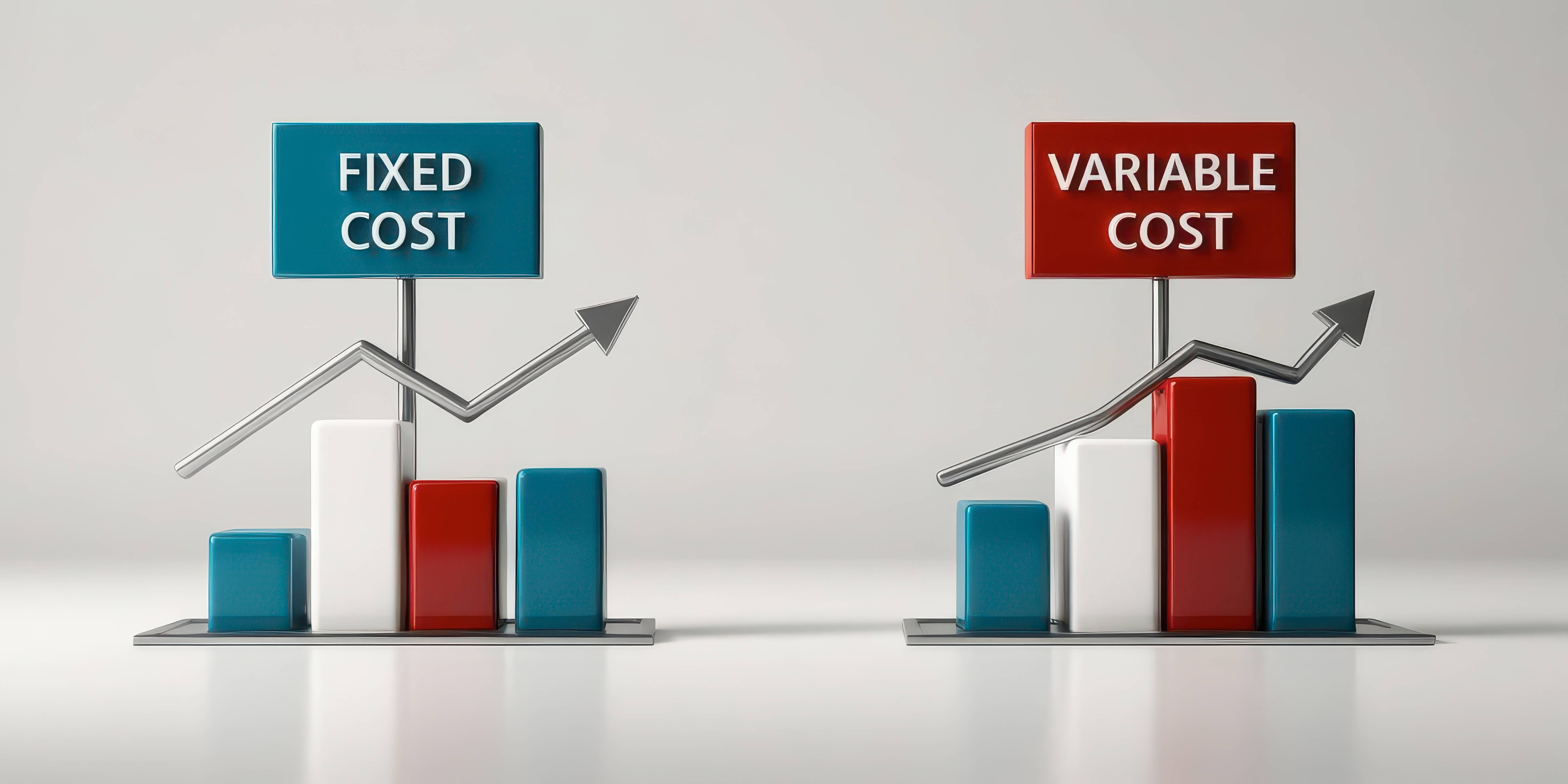Quick Summary
- Fixed Costs: Fixed costs are expenses that remain the same throughout one financial year, regardless of what kind of profit or loss the organisation has made.
- Variable Costs: Variable costs are the expenses that fluctuate with production or sales volume. Unlike fixed costs, they rise as output increases and fall when they decrease.
- Importance of Fixed and Variable Costs: Both types of costs help in pricing strategies, understanding profit margins and ensuring a smooth cash flow.
- Managing Fixed and Variable Costs: Fixed and variable costs can be managed through practical ways such as negotiations, shared resources, strong relationships with suppliers, labour and raw material optimisation
Invest Smartly with Mahindra Finance!
When you run a business, you need to know the ins and outs of every operation. One such aspect is the company’s cost structure, composed of variable costs and fixed costs. A variable cost is an expense that fluctuates depending on daily or monthly requirements while a fixed cost remains the same regardless of the daily or monthly requirements of the organisation.
But that’s not all. Both variable cost and fixed costs have several aspects that play a crucial role in business strategies, such as pricing decisions and profit forecasting. Let’s learn about both these types of costs in detail and do a comparative study of variable costs vs fixed costs.
What are Fixed Costs?
Fixed costs are those expenses that remain the same throughout one financial year, regardless of what kind of profit or loss the organisation has made. These primarily include costs incurred on rent, insurance, salaries, depreciating equipment cost, etc. These are considered the baseline expenses that an organisation needs to keep the business running.
For instance, if a business has a rented store in a particular city, the rent remains the same whether the business makes a 10% profit or a 10% loss.
What are Variable Costs?
Running a business comes with the responsibility of managing different expenses daily. Certain expenses change depending on factors such as the company’s profit, production, sales, loss, etc. Such expenses are called variable costs. These costs can change even daily, depending on a company’s level of production or sales.
Some common examples of variable costs include expenses such as raw materials, daily labour costs, sales commission, and electricity costs for machines. Variable costs are integral to every business as they drive the company‘s flexibility and scalability to a great extent.
Key Differences Between Fixed Costs and Variable Costs
Fixed cost and variable cost have their different set of importance for a business. For effective management of both types of costs, it is important to first understand the fixed cost and variable cost differences.
Take a quick look at this table, differentiating fixed cost from variable cost:
| Aspect | Fixed Costs | Variable Costs |
| Meaning | Fixed costs are those expenses that remain the same throughout the financial year, regardless of the profit or loss. | Variable costs are those costs that change typically in direct proportion of the company’s profit and loss. |
| Common Examples | Cost incurred on rent, insurance, salaries, depreciating equipment cost etc. | Cost incurred on raw materials, electricity, sales commission, daily wage labour etc. |
| Importance for the Business | Crucially important for the business in terms of fulfilling long-term obligations, breakeven points etc. | Crucially important for the business in terms of short-term flexibility etc. |
| Financing Needs | A smooth flow of fixed costs requires substantial capital even when the business is going downhill. | A smooth flow of variable costs required liquidity. |
Importance of Understanding Fixed and Variable Costs
Any business, whether it is a small or a large one, runs on a blend of fixed and variable costs. Therefore, it is important to understand how both these costs help in ensuring a smooth flow of business.
Here’s why understanding fixed costs in variable costs is crucial:
A Smart Pricing Strategy
Businesses must understand both fixed costs and variable costs before creating a pricing strategy. This ensures the business becomes profitable by smartly evaluating both types of costs before setting price points.
Ensuring Business Scalability and Growth
Every business aims to achieve growth and scalability. Understanding the fixed cost and variable cost of the business helps them decide when an expansion is profitable, and when cutting down expenses is the right choice.
Planning an Effective Budget and Cash Flow
As discussed above, a fixed cost has to be covered by a business regardless of the output, whereas variable costs can be adjusted depending on the business’s profit margins. Therefore, a detailed understanding of both these types of costs helps in planning an effective budget and ensuring smooth cash flow.
Identifying Cost Saving Windows
Running a business is not always about pouring all the money into expansion and scalability. At times, businesses need to identify cost-saving windows to become more profitable. By analysing fixed and variable costs, it is easier to identify areas where expenses can be reduced. A common example can be seen when a business tries to find suppliers that charge them less or when businesses try to negotiate a lower rent.
Suggested Read: Choosing Between Online and Offline Fixed Deposits: Which is Best for You?
How Fixed and Variable Costs Affect Profit Margins?
Profit margins are the cornerstone of every business as they not only help understand the conversion of revenue into profit but also help businesses create a more sustainable model. It is practically impossible to expand profit margins or even understand profit margins without fixed and variable costs. Here’s how fixed and variable costs affect profit margins across different types of businesses:
Effective Cost Allocation
Understanding the expenses incurred on covering variable and fixed costs helps in effective cost allocation, which is crucial for smart pricing strategies. Without analysing variable and fixed costs, businesses risk developing a pricing strategy that results in either underpriced products/services, leading to losses, or overpriced products/services, leading to customer annoyance.
Meeting Breakeven Point
Fixed and variable costs are key factors in helping a business meet the breakeven point. This is simply because businesses with higher fixed costs usually require increased sales to cover the fixed costs, and post that, profits start growing rapidly.
On the other hand, businesses with high variable costs may meet breakeven points easily. However, with fewer sales, their profit margin decreases. Therefore, it is important to strike a balance between the cost to meet the breakeven point and efficiency.
Taking Strategic Decisions
Fixed and variable costs play a significant role in strategic decisions, including expansion, cost control, and financing needs. Businesses must understand how these costs interact.
How to Manage Fixed and Variable Costs Efficiently?
Here are some practical tips and strategies that can help manage fixed and variable costs efficiently:
Managing Fixed Costs
- Negotiation Matters
- Whether it is a lease or rent agreement or a long-term supply contract, it is important to negotiate smartly and source terms and clauses that are favourable for your business.
- Opt for Shared Resources
- In today’s time, opting for shared resources has become a common strategy for many businesses. Coworking spaces, outsourcing services or even shared logistics are some options to consider.
- Review Your Contracts
- Make sure to review your contracts every six to eleven months to evaluate whether they are still providing good value.
Managing Variable Costs
- Rely on Flexible Models
- Adopting flexible models is a smart variable cost management strategy. This can include hiring staff or renting other resources during the peak season for maximum optimisation.
- Build Strong Relationships
- Whether your business is based on products or services, building a strong relationship with your suppliers is something that goes a long way in managing variable costs. You can get discounts on bulk purchases.
- Keep Looking for Cheaper Solutions
- When starting from raw materials, energy, logistics, and contractual staff, it’s essential to always look for cheaper solutions or alternatives.
Example
Let’s consider a hypothetical small business, “Jaipur Prints,” run by an entrepreneur named Priya, who strategically manages her costs to boost profitability ahead of the busy Diwali season. To tackle her fixed costs, she negotiates her workshop’s annual rent increase down from 10% to 6% by committing to a longer lease. She further reduces overhead by utilizing a co-working space for administrative tasks and partnering with a shared logistics service, rather than owning her own delivery infrastructure. On the variable cost front, Priya is equally savvy. To handle the festive rush, she hires artisans on a flexible piece-rate basis, ensuring labour costs align perfectly with production. Her strong relationship with her fabric supplier gets her a 7% bulk discount.
Through these combined efforts, Priya effectively lowers both her fixed and variable costs thus significantly improving her profit margins.
Why Mahindra Finance is the Right Partner for Managing Business Costs?
Striking a balance in managing variable costs and fixed costs can position your business better in the market. On the journey of managing business costs, there can be several challenging obstacles. Mahindra Finance, a leading NBFC in India, helps entrepreneurs achieve their goals with our simple, easy, and seamless financing solutions through SME loans.
Suggested Read: How The Tenure Of Your FD Affects Its Interest Rate
FAQs On Variable Costs vs. Fixed Costs
Is salary a fixed or variable cost?
A salary is a fixed cost as it has to be paid at regular intervals, irrespective of the business making a profit or loss.
Can a cost be both fixed and variable?
Yes, a cost can be both fixed and variable, and such costs are known as mixed costs. A common example is utility bills, where a fixed portion is paid as a monthly service charge and the per-unit charge becomes a variable charge.
How can a business reduce its fixed costs?
Effective ways to manage or reduce fixed costs include negotiating agreements, opting for shared resources, and reviewing contracts.
Which is more important for a business: fixed costs or variable costs?
Neither fixed nor variable costs are universally more important; their significance is entirely dependent on a business’s specific goals, industry, and economic situation. A successful business must understand and manage the interplay between both to ensure profitability and long-term stability.
Can variable cost be controlled?
Yes, variable costs can be controlled or managed. Some effective ways to efficiently manage variable costs include following a flexible model, building strong relationships with suppliers, and seeking cheaper alternatives.
What is the impact of fixed and variable costs on pricing?
For an effective pricing strategy, it is essential for the business to first analyse its fixed and variable costs that are incurred either in whole or per unit. Once this picture is clear, businesses can effectively reach a pricing strategy that helps them either reach the breakeven point or expand profit margin.
























































